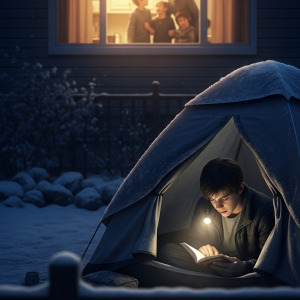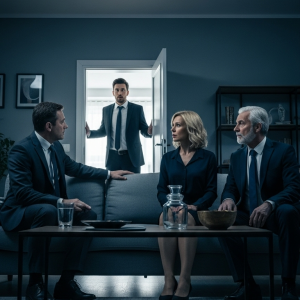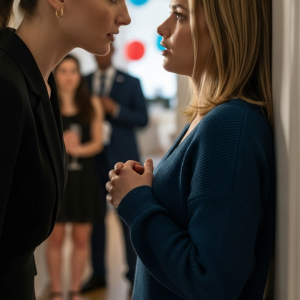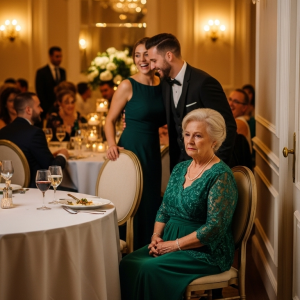I never imagined that the day my own daughter came into money, the first thing she’d do was cast me aside. But there I stood, rain soaking through my sweater and mascara bleeding down my face, watching the security lights of her new mansion blind my swollen eyes. It wasn’t the storm that broke me. It was her voice.
“You’ll never see a dime of my money, you old witch!”
Then the suitcase hit the concrete. My suitcase. The one I had packed that morning with neatly folded clothes and hope in my heart. It burst open on her spotless driveway, spilling out my life in worn cotton and faded nylon. My toothbrush rolled into the gutter like it knew it didn’t belong anymore.
She didn’t flinch. Standing behind her, arms crossed and smirking, was her new boyfriend, barely older than her son. The mansion behind them still had real estate ribbons on it.
I didn’t scream. I just stood there, letting the rain slick my gray hair to my scalp. Thank God her kids weren’t home. They didn’t have to see their grandmother thrown out like a worn-out mop.
“You’re a leech!” she shouted from the doorway. “I worked hard for this! You don’t get to mooch off me just because you’re old!”
Worked hard? My jaw clenched. I had paid her rent for four years. Raised her boys while she jumped from job to job. Gave up my retirement so she could start over, again and again. But I didn’t say a word. I refused to give her the satisfaction of watching me fall apart.
I picked up my socks one by one, my hands trembling from the cold. I clutched the broken suitcase to my chest and stepped back. She thought I’d crawl back, that I’d beg. What she didn’t know was that she’d made a small mistake. One that would cost her everything.
A few weeks earlier, we were still a team. Or at least, that’s what I told myself. I was folding her kids’ laundry, cooking dinner, and covering half the bills out of my modest pension. Our little house was messy and loud, but it was home.
We had a silly ritual. When life felt too heavy, we’d each buy a two-dollar lottery ticket from the corner gas station. We’d sit at the kitchen table and laugh at the idea of getting rich.
“If I ever win, I’m splitting it with you, Mom,” she used to say. “I got you.” She said it enough times that I believed her. Even when she didn’t pay her half of the water bill. Even when she left me to watch the boys so she could go on “interviews” that always seemed to end at bars. That’s what mothers do. We cushion the falls.
But that week, something shifted. She was distant, whispering behind closed doors. That Thursday, the local news announced that a winning lottery ticket—ten million dollars—had been sold at our regular gas station.
She shifted beside me on the couch but didn’t smile. “You buy one from there this week?” she asked, her voice too casual.
“Yeah,” I replied. “Grabbed one Monday with the groceries. Why?”
She shrugged. “Just curious.”
The next morning, my ticket was gone. It wasn’t in the junk drawer, not on the fridge, not in my wallet. My stomach tightened, but I didn’t ask her. I didn’t want to believe it.
The next day she came home with new designer shoes. Then a fancy purse. “A bonus,” she said. I needed to believe her.
A few days later, she burst through the door, waving a check. “I won!” she screamed, her voice trembling with joy. “Ten million dollars! I actually won!”
I looked at her, and in that moment, I knew she was lying. She never carried cash, hated waiting in line. Yet somehow, this week of all weeks, she magically had the winning numbers. I forced a smile. She hugged me, promising, “We’re going to live the life we deserve.”
Us. But I knew better. That “us” had an expiration date, and it was coming fast.
Three days later, she was gone. No goodbye, just silence and a half-empty closet. My neighbor saw the moving truck. It had come before sunrise while I was in the back garden pulling weeds. She didn’t just move out; she escaped. Like I was something to run from.
I walked into the kitchen and stared at the fridge. The smiley-face magnet was still there, but the ticket—the one I had bought, the one I had pinned up—was gone. It wasn’t a suspicion anymore. She had taken my future and bought herself a new life with it.
I opened the junk drawer and pulled out an old envelope. Tucked inside was a faded photo I’d taken of the ticket the day I bought it, just for fun. The numbers were blurry, but the time stamp was clear. The store name, the date, the time. It was mine.
And suddenly, the tears I’d swallowed all week began to fall. Not from pain, but from clarity. She thought I was too old, too soft to notice. But she’d forgotten one crucial detail.
I was the one who signed the back of that ticket. And that tiny oversight was about to unravel everything.
I didn’t go to her. Instead, I went back to the gas station. Ben, the man behind the counter, smiled when he saw me.
“Ben,” I said, my own smile tight. “I need to ask you something. Do you still have the security footage from last Monday?”
His smile faded. “Why?”
“Because my ticket’s gone, and someone else is claiming they bought it. I signed the back of it, Ben. Like I always do.”
Ten minutes later, we were in a tiny back office staring at a grainy monitor. And there I was. I watched myself hand over the cash, take the ticket, pull a pen from my purse, and sign the back. My name. Marjorie Blake.
“You want to record this?” Ben asked.
I pulled out my phone. “Yes, please.”
That evening, with the photo, the footage, and the receipt, I called the state lottery office. I told them everything.
“If your name is on the back and it matches the footage, we’ll open a formal investigation,” the woman on the line said. “We can freeze the payout once the process begins.”
I didn’t gloat. I didn’t cry. I just exhaled. For the first time in weeks, I wasn’t waiting to be saved. I was standing up for myself. While she was busy curating her new life for strangers, I was quietly building my case. A lawyer named Dana Whitaker looked at my evidence and said, “This isn’t a mistake. It’s theft. And you have a case.”
By the end of the week, the commission had frozen all accounts linked to the payout. I still didn’t tell her. People like my daughter never see the crash coming. They’re too busy dancing in the storm.
Her social media became a showroom of stolen wealth. New bags, poolside brunches, rooftop cocktails. Every post was a declaration, every caption a jab disguised as self-love. Finally free from leeches. Cutting out the toxic ones for good. No names, but I knew who she meant. And her new friends applauded. Good riddance to dead weight! Live your life, girl!
She let them rewrite our history, replacing my years of sacrifice with a single word: leech. I didn’t respond. I just took screenshots. Every comment, every tagged location, every high-end purchase documented her spending money that legally wasn’t hers. The louder she bragged, the deeper she dug her own hole.
Then, two days after the commission froze the funds, her feed went dark. Silence. I pictured her confusion turning to panic as her cards were declined, her access denied. I didn’t smile. This wasn’t about revenge; it was about dignity.
The state verified every detail. Once it was official, they scheduled a small press conference to make the truth public. No warning was sent to her. She had already told her story, loud and proud. Now, it was my turn.
That day, I walked into a small community hall with Dana by my side. When they called my name, I stepped up to the microphone. “My name is Marjorie Blake,” I said clearly. “I bought that ticket. I signed it. I am the rightful winner.”
For the first time in years, the world listened.
The news broke fast. My phone started buzzing, but I didn’t answer. I was waiting for her. At 1:43 p.m., her name lit up my screen.
“You stole my life!” she spat, her voice raw and unraveling. “You humiliated me! My accounts are frozen! What am I supposed to do now?”
I let the silence hang. Then, calmly, I said, “You could start by saying thank you.”
A scoff. “For what?”
“For the five years I kept a roof over your head when you couldn’t hold a job,” I said, my voice steady. “For raising your children while you ‘found yourself.’ For paying off your credit cards. For not calling the police when you stole from me.”
Her bravado cracked. “This is revenge!” she hissed.
“No,” I replied. “This is truth. You built your life on a lie. I just stopped letting you pretend it was a palace.”
Her voice changed, becoming desperate and small. “I need help.”
Not remorse. Not love. Just need. The silence was my answer.
“You got what you wanted,” her voice hardened again. “You’re the winner. Are you happy now?”
I paused. And for the first time in a very, very long time, I smiled. “No,” I said. “But for ten million dollars, I bought you out of my life.”
And I hung up. No anger. Just peace.
She never called again. I heard the aftermath in whispers: the mansion under review, the leased convertible repossessed, the followers quietly unfollowing. The state finalized the transfer. I received the check, paid off my mortgage, donated a significant portion to women’s shelters, and took my grandsons on a quiet trip to the coast.
Weeks later, she showed up at my door. No makeup, no heels, no arrogance. Just a sweatshirt and eyes that looked ten years older. She stood there, waiting. Then she whispered, “Mom, I don’t have anywhere else to go.”
I heard her, but I didn’t open the door. Some bridges don’t need to be rebuilt. Some lessons don’t sink in until the silence is louder than the scream. What she never understood was that strength doesn’t always look like shouting. Sometimes, it looks like turning around and not looking back. This wasn’t revenge. This was release.
I stood by the door for a long time after she left. She didn’t knock again. Just walked away, slow and heavy like the weight of her choices was finally settling in. I watched from the kitchen window as she stepped down the porch, arms wrapped around herself in the wind, her once-perfect ponytail unraveling into strands.
I didn’t feel victorious. Just tired.
That night, I made tea in silence. No TV. No phone. Just the gentle whistle of the kettle and the occasional creak of the floorboards, like the house itself was adjusting to a new kind of quiet. One without drama. One without lies.
The next morning, I found a note under the doormat. Folded in half, no envelope. In her handwriting.
“I’m sorry. I know that’s not enough, but I don’t know what else to say. I’m broke. I’m lost. I miss the boys. Please let me see them. Please.”
There was no “I miss you,” no “I love you.” But it was the first crack in the wall she had built so high, so thick, for so long.
I sat at the table, reading it over and over. My first instinct was to tear it up. But something in me — something old, soft, maternal — told me to keep it. Not to forgive, but to remember: even the cruelest stories have pauses. And not every villain stays one forever.
But I didn’t write back.
Instead, I called my oldest grandson’s school and arranged a surprise visit. I showed up with a packed lunch and his favorite cookies. His eyes lit up when he saw me. I hadn’t realized how much I’d missed his voice, his stories, the way he interrupted himself three times just to describe the same soccer goal.
“Where’s Mom?” he asked as we sat on a bench under the oak trees.
I hesitated. “She’s figuring things out.”
He nodded, like that answer was enough. Maybe it was.
We talked about school, about the new math teacher he hated, about the girl who beat him in a spelling bee and then made fun of him for it.
I listened.
That became our new rhythm. Me, dropping by for visits. Sometimes lunch, sometimes just to walk them home. Their father had custody now — finally stepping up after years of drifting. He didn’t say much to me, but he didn’t shut the door either. I think he saw the news. Maybe he saw the receipts too — the literal ones, from when I used to buy diapers when his name was still on the lease.
Weeks passed. My daughter never came back. No more notes. No more phone calls. Just space. Blessed, sacred space.
But healing has a strange way of surfacing in small things. Like the way I started sleeping through the night. The way my shoulders stopped curling in. The way I looked in the mirror one morning and saw myself again — not someone’s mother, or wallet, or doormat. Just Marjorie Blake. Woman. Fighter. Survivor.
I got involved with a local community center. Helped other women who’d been taken advantage of — not just financially, but emotionally, spiritually. Women like me. Women who gave and gave until they forgot they were allowed to receive.
One woman, Denise, had been living in her car after her daughter took over her apartment and wouldn’t let her back in.
“She said I was too negative,” Denise muttered. “Toxic. That I brought the energy of struggle into her ‘manifestation space.’”
We laughed. Not because it was funny. But because sometimes, you have to laugh to keep from crying.
I shared my story. Not all at once. Just pieces. The part about the ticket. The part about the suitcase. The part where I stood in the rain and felt fifty years of love dissolve in a single sentence.
They listened. They understood. And that made all the difference.
Healing isn’t linear. Some days, I still reached for my phone, half-expecting an apology that would never come. Some nights, I dreamed of her as a little girl, running barefoot in the backyard with chocolate on her cheeks and no clue how to say thank you.
But I didn’t chase those ghosts. I let them drift.
One Saturday, I got a letter in the mail. Real mail, not email. It was from the lottery commission. I had forgotten they were sending a final breakdown of the payment, taxes deducted, etc.
Along with it was a small envelope. No return address.
Inside was a check. Ten thousand dollars. And a note.
“For the boys. For the woman I used to know. I don’t expect anything. But I remember.”
It wasn’t signed. But I knew.
She was out there. Not redeemed. Not forgiven. But maybe — just maybe — trying.
I deposited the check and set up two college funds. One for each boy. I told them it was from someone who once loved them in her own broken way.
They didn’t ask questions. They just hugged me.
Months turned into a year.
The news stopped calling. The story faded from gossip blogs. People moved on. But I didn’t return to my old life — because that life never really belonged to me. It was a borrowed identity stitched together by survival. Now, I was building something new.
I started painting again. Just small things — florals, landscapes. Things that made me breathe slower.
A local gallery picked up a few of my pieces. “There’s something bold in your brushwork,” the owner told me. “Like you’ve been through hell and came back with better taste.”
I laughed. “That’s one way to put it.”
I painted a series called “Fractures.” Each piece was a blend of beauty and brokenness — a cracked teacup filled with blooming roses, a mirror shattered but reflecting sunrise, a woman’s silhouette with her heart made of glass but still glowing.
People responded. They saw themselves in the cracks. One woman bought three of them.
“This one,” she said, pointing to the teacup, “this is how I feel most days. But this —” she pointed to the rose inside it, “—this is how I want to feel.”
I told her: “You already do. You just don’t see it yet.”
The house grew quieter, but not lonelier. I learned to enjoy the space. The stillness. I filled it with music. Jazz in the mornings, classical in the evenings, Nina Simone when it rained.
I kept a candle lit by the window. Not for her — but for the version of me I nearly forgot. The woman who believed love meant sacrifice without limit. The woman who didn’t know she could say no. That candle was a promise: never again.
And then, one Sunday, as I was watering the garden, a car pulled into the driveway.
It wasn’t her. It was her son — my youngest grandson. He stepped out with a small backpack and a shy smile.
“Dad said I could stay with you for the weekend.”
I opened the gate.
“Of course, sweetheart. I’ve got your room ready.”
He ran in, and for a moment, the house pulsed with life again. Laughter echoed down the hallway. I watched him pick out a bedtime story, curl up on the couch, ask for extra whipped cream on his cocoa.
As I tucked him in that night, he looked up and said, “Grandma, why don’t we live with you anymore?”
I didn’t lie.
“Because grown-ups make choices,” I said softly. “And sometimes, those choices hurt. But that doesn’t mean the love disappears.”
He blinked, trying to understand. Then he nodded. “I like your house better. It smells like cookies and doesn’t have yelling.”
I kissed his forehead. “That’s because this house runs on peace. Not power.”
The next morning, I stood by the window, coffee in hand, watching him play in the yard. My garden bloomed behind him. Life — real, flawed, gentle life — had returned.
And I realized something.
Ten million dollars didn’t buy me happiness. It bought me clarity. It bought me silence where there was once shouting. It bought me back my name.
Marjorie Blake.
Mother. Grandmother. Painter. Survivor.
And finally, finally, free.




